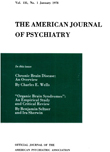CLINICAL OBSERVATIONS OF SIMULTANEOUS HALLUCINOGEN ADMINISTRATION IN IDENTICAL TWINS
Abstract
1. Different initial affective responses occurred in identical twins under the influence of d-LSD-25 and psilocybin.
2. These affective displays were related to the differences in personality between the twins.
3. It was possible for the affectivity of each twin to influence the affective response of the other at various times during the studies.
4. This communication of affect substantiates the hypothesis that affective responses associated with hallucinogen administration are personality specific rather than drug specific(1, 2, 3, 4, 5).
5. The drug specific changes in the autonomic, proprioceptive and perceptual spheres were similar in both twins and not modified to any noticeable extent by environmental influences.
6. Because of their profound effects, hallucinogens should be restricted to research use exclusively in a hospital setting. In our opinion, their use at this time for any other purpose or in any other setting is dangerous.
Access content
To read the fulltext, please use one of the options below to sign in or purchase access.- Personal login
- Institutional Login
- Sign in via OpenAthens
- Register for access
-
Please login/register if you wish to pair your device and check access availability.
Not a subscriber?
PsychiatryOnline subscription options offer access to the DSM-5 library, books, journals, CME, and patient resources. This all-in-one virtual library provides psychiatrists and mental health professionals with key resources for diagnosis, treatment, research, and professional development.
Need more help? PsychiatryOnline Customer Service may be reached by emailing [email protected] or by calling 800-368-5777 (in the U.S.) or 703-907-7322 (outside the U.S.).



